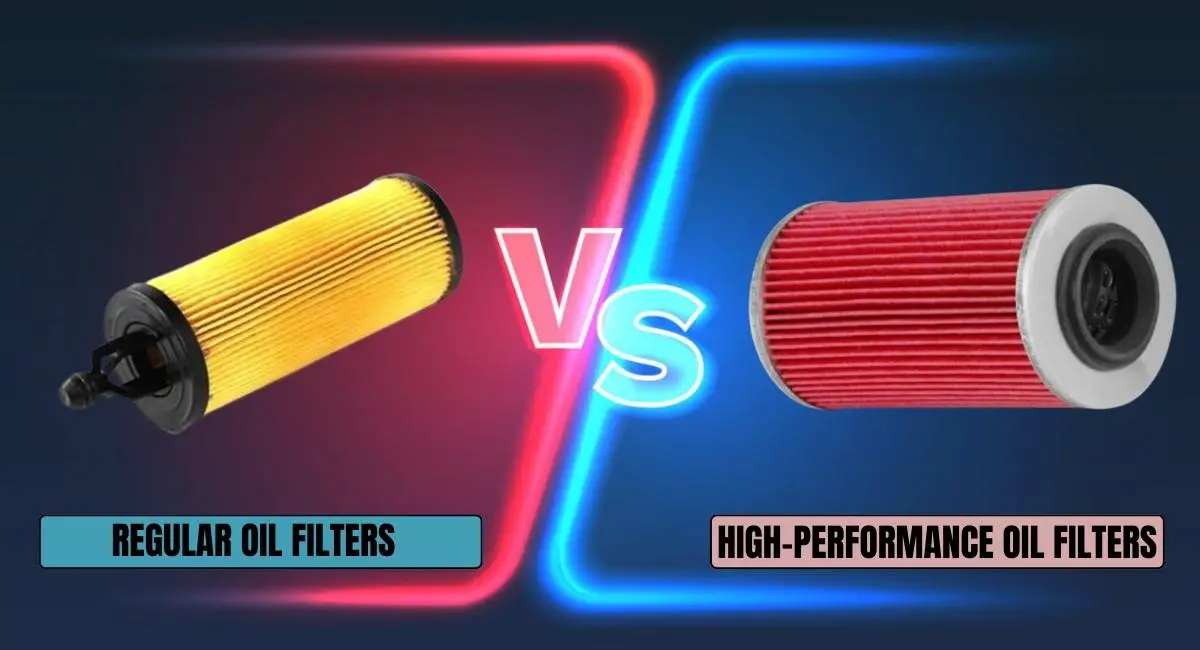Every drop of oil that courses through the veins of your vehicle’s engine is a life-sustaining force, a liquid elixir that reduces friction, cools engine components, and keeps intricate mechanical parts running smoothly.
However, the moment the oil begins its journey from the oil pan into the engine, it starts picking up a variety of contaminants. Dust, metal particles, soot, and other unwelcome guests hitch a ride, seeking to damage your engine from the inside out. Enter the unsung hero: the oil filter, a guardian that stands guard, purifying the oil and ensuring only clean, uncontaminated oil reaches your engine.
Not all heroes are created equal. A great debate exists in oil filters – the classic showdown between high-performance and regular oil filters. While both serve the purpose, their efficiency, longevity, and ultimate impact on engine performance, this article aims to break down the complexities of this debate.
But first, what does an oil filter do?
What Does a Performance Oil Filter Do?
Oil filters play a critical role in the longevity and efficient operation of an engine. Here are some of their primary functions:
Filtration of Contaminants: The primary function of an oil filter is to filter out any contaminants that may have found their way into the oil. It includes dust, metal particles, soot, and other debris that could damage the engine.
Engine Lubrication: Clean oil is vital for the lubrication of engine components. By removing impurities, oil filters ensure that the oil can effectively reduce friction between moving parts and prevent wear and tear.
Cooling: As oil circulates throughout the engine, it helps to dissipate heat from the combustion process, aiding in cooling the engine. Clean oil performs this function more effectively, highlighting the importance of the oil filter in maintaining optimal engine temperature.
Enhanced Engine Efficiency: Clean oil ensures a smooth and efficient engine operation. By removing contaminants, oil filters help maintain oil quality, providing the engine runs efficiently.
Preventing Engine Damage: Contaminants, if not removed, can cause damage over time, leading to engine breakdown. Oil filters help prevent this damage, prolonging the engine’s life and reducing the likelihood of costly repairs.
Maintaining Oil Pressure: Some oil filters have pressure relief or bypass valves. If the oil filter becomes clogged and the oil can’t pass through it, this valve opens to allow oil to bypass the filter, ensuring that oil continues circulating within the engine. While the bypassed oil is not filtered, it’s better than having no oil circulation, which could cause severe engine damage.
In summary, oil filters are crucial in maintaining your engine’s performance, efficiency, and longevity. They ensure the oil circulating within your engine remains clean and free of damaging contaminants.
How Important is the Quality of the Oil Filter?
The quality of the oil filter is crucial for the overall performance and longevity of your vehicle’s engine. An oil filter might be a small component, but its role in maintaining your engine’s health is substantial. Here’s why the quality of the oil filter is so important:
Efficient Filtration
High-quality oil filters are typically more effective at trapping and retaining contaminants. They often use superior filter media to capture even the smallest particles, ensuring cleaner oil circulation within the engine.
Durability and Longevity
Quality oil filters are generally more robust and have a longer service life. They can withstand extreme conditions and don’t easily degrade over time, meaning they don’t need replacement as frequently.
Improved Engine Performance
With a high-quality filter, the oil in your engine will be cleaner. This results in better lubrication of engine components, reduced friction, and improved engine performance.
Enhanced Engine Protection
Quality filters provide better engine protection. They effectively remove contaminants that can cause wear and tear on engine parts, helping to extend your engine’s lifespan.
Cost Savings
Although high-quality oil filters might be more expensive upfront, they can lead to significant cost savings in the long run. Providing superior engine protection and extending oil change intervals can help reduce overall vehicle maintenance costs.
Consistent Oil Flow
High-quality oil filters are designed to maintain a constant oil flow, even under challenging conditions. They often feature a built-in bypass valve that ensures continuous oil flow, even when the filter is clogged.
Understanding Regular Oil Filters
Regular oil filters, also known as standard oil filters, are typically used in most vehicles. These filters design traps contaminants and prevent them from causing wear and tear on the engine components. The filter media, often made of cellulose, synthetic materials, or both, allows the oil to flow through while collecting debris.
Regular oil filters contribute significantly to maintaining the engine’s performance by minimizing the wear of internal parts, keeping the oil clean, and improving overall engine efficiency. Some common brands of regular oil filters include Fram, Bosch, and Mann.
From a cost perspective, regular oil filters are typically cheaper and have a recommended change interval of around 3000 to 5000 miles, depending on the vehicle and driving conditions. However, these filters may have limitations, such as lower filtration efficiency and capacity than their high-performance counterparts.
Understanding High-Performance Oil Filters
As the name suggests, a high-performance oil filter, also known as an automotive performance oil filter, delivers superior performance. They often feature advanced filter media, like fully synthetic materials, which provide higher filtration efficiency and capacity. These filters can trap smaller particles and hold more contaminants, which results in cleaner oil and extended engine life.
Brands like K&N, Royal Purple, and Mobil 1 are known for their range of high-performance oil filters. These filters are often more expensive, but they offer longevity with recommended change intervals typically extending to 10,000 miles or more, making them a cost-effective solution in the long run for drivers who clock a high number of miles.
The key advantage of high-performance oil filters lies in their ability to provide superior engine protection, particularly under extreme driving conditions. Trucks, SUVs, and other heavy-duty vehicles frequently tow heavy loads or go off-roading can also benefit from high-performance oil filters. However, for the average driver with standard commutes, the necessity of a high-performance filter over a regular filter is subjective and dependent on various factors.

High-Performance Oil Filter vs. Regular Oil Filter: A Comparative Analysis
When it comes to automotive performance, the oil filter choice can significantly influence your vehicle’s lifespan and efficiency. Regular oil filters offer adequate protection under normal driving conditions and are cost-effective for routine maintenance.
Automotive Performance
Choosing between high-performance and regular oil filters can significantly impact your vehicle’s performance. Regular oil filters for everyday use and standard driving conditions can maintain and support satisfactory vehicle performance. They are more than capable of filtering out the majority of impurities, ensuring that your engine remains in good health.
On the other hand, high-performance oil filters excel when vehicles face more demanding conditions. These filters can withstand higher pressure and temperature variations, providing excellent filtration even under extreme conditions. They are particularly beneficial for high-performance or heavy-duty vehicles, where superior engine protection is paramount.
Lifespan and Cost Effectiveness
You must replace regular oil filters every 3000 to 5000 miles, a relatively shorter interval than their high-performance counterparts. However, they are more affordable initially, making them a cost-effective choice for regular maintenance.
High-performance oil filters offer extended service life, usually up to 10,000 miles or more, despite having a higher upfront cost. This feature makes them a potentially more cost-effective choice in the long run, particularly for drivers who clock up high mileage or those who prefer extended oil change intervals.
Filtration Efficiency and Engine Protection
High-performance oil filters generally outdo regular filters when it comes to filtration efficiency. Their design can trap even smaller particles, resulting in cleaner oil and a healthier engine. Moreover, their larger capacity means they can hold more contaminants before getting clogged, ensuring an uninterrupted flow of clean oil.
While still providing sufficient filtration for most driving conditions, regular oil filters may offer a different level of thoroughness in removing minuscule contaminants.
Role of Driving Conditions
Driving conditions can significantly influence the choice of oil filters. Regular oil filters are well suited to standard commuting and normal driving conditions. They offer adequate engine protection and are a cost-effective solution under such circumstances.
However, the superior protection offered by high-performance oil filters can be invaluable in harsh driving conditions, such as frequent stop-and-go driving, towing heavy loads, or high-performance vehicles. These filters can perform optimally under severe conditions, providing peace of mind and an added layer of engine protection.
Besides, high-performance and regular oil filters have their strengths and ideal use cases. The choice will largely depend on your driving conditions, vehicle type, and maintenance preferences.
Conclusion
High-performance and regular oil filters have a place in automotive care, depending on your vehicle’s needs, driving conditions, and personal preference. While regular oil filters are cost-effective and satisfactory for general use, high-performance filters excel in demanding requirements and deliver superior engine protection. Understanding the differences between high-performance and regular oil filters can help you make an informed decision that ensures the optimal performance of your vehicle.
